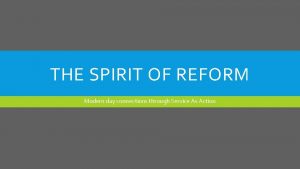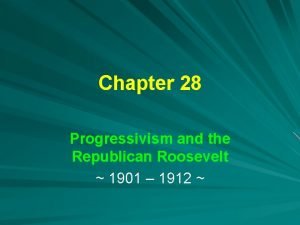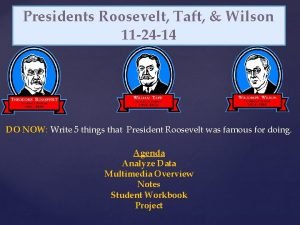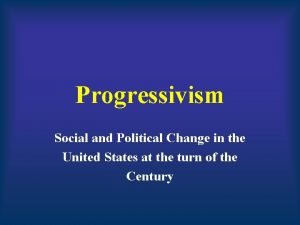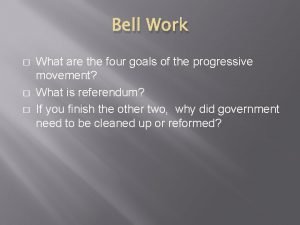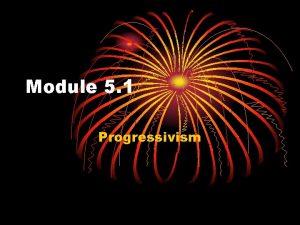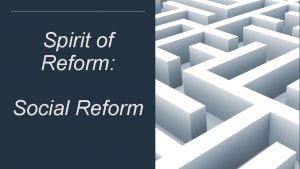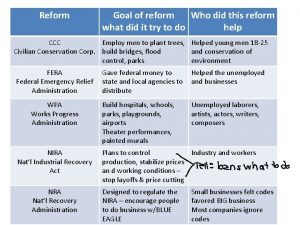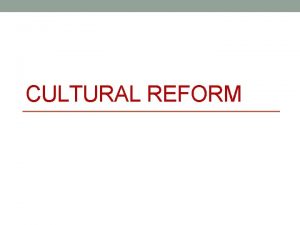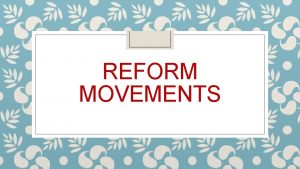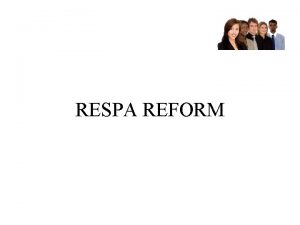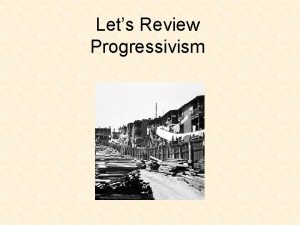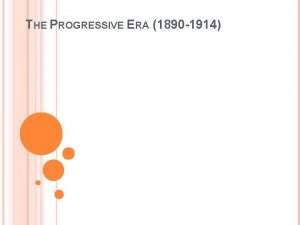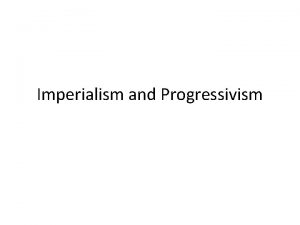The Spirit of Reform Progressivism What is Progressivism















- Slides: 15

The Spirit of Reform Progressivism

What is Progressivism? �Progressivism: A reform movement that came about as a response to many of the problems that arose during the modernization of America. The movement sought to bring about positive changes to American society focusing on breaking up trusts, regulating businesses, fighting for social justice, and giving power back to individuals. Think of PROGRESS: gradual betterment; especially : the progressive development of humankind

Who is a Progressive? �Progressive: Reformer who worked to improve social and political problems.

Progressive Reform �Industrialization led to many problems that most in society thought needed to be fixed. �Progressives did not agree on which problems were the most important or what was the best way to fix them. As a result, progressives worked for reforms in many areas �One agreement between progressives was that the federal government needed to step in!

Muckrakers �Progressives were moved to action by journalists who wrote about corruption in business and politics. �Muckrakers: Journalists who “raked up” and exposed the muck, or filth, of society. Muckrakers brought the problems of society into public view which helped unite reformers.

Notable Muckrakers �Ida Tarbell: Wrote articles attacking John D. Rockefeller’s Standard Oil Company �Thomas Nast: Drew political cartoons attacking Boss Tweed and Tammany Hall �Upton Sinclair: Author of “The Jungle” and “The Flivver King” wrote books exposing the conditions in many industries

Progressive Leaders- Women �Suffrage Leaders: Susan B Anthony: Co-founder of NAWSA Elizabeth Cady Stanton: Co-founder of NAWSA Carrie Chapman Catt: NAWSA Leader Alice Paul: Founder of NWP �Other Reforms: Jane Addams: Founder of Hull House in Chicago Florence Kelley: Fought for child labor reform Ida B Wells: Outspoken critic of discrimination against African Americans Frances Willard: President of WCTU

Progressive Leaders- African Americans �Booker T. Washington: Founder of Tuskegee Institute urging African Americans to improve their own education and economic well being instead of fighting against discrimination �W. E. B. Du Bois: Founder of NAACP; wanted to directly fight against social injustice �Ida B. Wells: Outspoken critic of discrimination against African Americans

Progressive Leaders- Presidents �Theodore “Teddy” Roosevelt: Believed president should be an active leader instead of administrator Square Deal: Roosevelt’s policy of balancing the interests of business, labor, and consumers Helped labor unions bargain with management Conservation: Protection of nature and its resources Trust Buster


Progressive Leaders- Presidents �William Howard Taft: Succeeded Teddy Roosevelt and believed in many of the same issues ▪ Differed on how the President should use their power

Progressive Leaders- Presidents �Woodrow Wilson: Won election in 1912 after Roosevelt and Taft split the Republican vote Fought for many progressive reforms “New Freedom” Policies

Major Progressive Victories �Pendleton Civil Service Act: Replaced spoils system with merit system �Amendments 17 -19 17 th Amendment- Direct Election of Senators 18 th Amendment- Prohibition of Alcohol 19 th Amendment- Women’s Suffrage �Pure Food and Drug Act: Regulated the manufacture, sale, and transportation of food and drugs

Major Progressive Victories �Federal Reserve Act: Set up a national banking system with the goal preventing sudden booms and busts in the economy �Clayton Anti Trust Act: Strengthened earlier federal laws against monopolies �Federal Trade Commission: Group created to stop unfair business practices

Themes of Progressive Reform �Political leaders finally siding with the people over business �Government regulation of industries �Growth of federal government power over individual states �Rights of minority groups being recognized
 The spirit of reform lesson 1
The spirit of reform lesson 1 Come holy spirit, come hymn
Come holy spirit, come hymn Spirit spirit of gentleness
Spirit spirit of gentleness Progressivism and the republican roosevelt
Progressivism and the republican roosevelt Idealism realism pragmatism existentialism
Idealism realism pragmatism existentialism Chapter 29 wilsonian progressivism at home and abroad
Chapter 29 wilsonian progressivism at home and abroad Where will you put your million dollars dbq answers
Where will you put your million dollars dbq answers Comparing the progressive presidents
Comparing the progressive presidents Reconstructivism meaning
Reconstructivism meaning Characteristics of progressivism in education
Characteristics of progressivism in education What were the four goals of the progressive movement?
What were the four goals of the progressive movement? Wilsonian progressivism in peace and war
Wilsonian progressivism in peace and war Imperlaist
Imperlaist Idealism curriculum trends
Idealism curriculum trends What is progressivism philosophy
What is progressivism philosophy American pageant chapter 29
American pageant chapter 29
